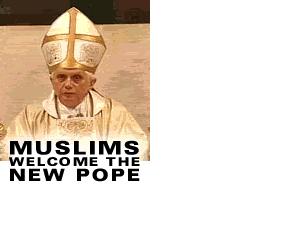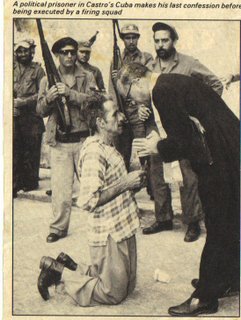Now that the righteous, unrighteous, pragmatic, opportunistic and hypocritical angers have gone slightly off the boil, it’s time for a reassessment of Pope Benedict’s analysis of the intellectual and arrogant dominance of reason in Western Europe. That after all, was what his Regensburg address was about. Inevitably, reaction to it was hijacked by Muslim over-reaction to one small part of it. Can you expect anything else from a religion that demands submission in every aspect of its exposition?
No, what I have found difficult to accept is the way in which the Pope, not only being left to contend with the above mentioned angers, was, in the words of an American Catholic news agency, hung out to dry by Catholics who were leaden-footed, if not actually dragging their heels, in coming to his defence. One glorious exception; Sister Leonella Sgorbati, martyred missionary in Somalia, a country at present being taken over by Islamic fundamentalists, armed as always with the Qu’ran, sharia law and swords to implement it.
An examination of the three main Catholic newspapers on sale in church porches in Scotland provide a spotty reaction. Least acceptable is the editorial of the Scottish Catholic Observer (SCO) which begins, “There may be an argument as to whether Pope Benedict was wise to include the comments of a Byzantine Emperor…” It goes on to suggest Benedict’s advisers should have counselled against inclusion of this. In SCO-speak, this suggests they should have censored it. The newspaper devotes one column of text and its editorial in an image-filled edition to the affair, one week after it took place. Always politically correct with a tendency to patronise on occasion, it cites the efforts of the Scottish Bishops to develop positive relationships through the Inter Faith Council. Perhaps more regular bulletins on the work of this group would help Scottish Catholics to understand other faiths better.
The Catholic Times, defensor fidei and whose letters columns are something else again, one half of the Gabriel Communications stable, whose journalists seem interchangeable with The Universe’s, its other half, concentrated its editorial input on apologies and the non-acceptance of them. Its main columnist began his regular column with the statement that “Pope Benedict XVI has endangered Christian minorities in Islamic countries with his quotation from Manuel II Palaeologus….” He then goes on to an historical disquisition on this individual, taking up three columns, then to some analysis of Benedict’s lecture. Nowhere does he follow up his initial comment on endangering Christian minorities.
The Universe, tabloid doppelganger of the Catholic Times, emphasised apologies, respect and misunderstandings from Benedict and provided three pages of what pleased it to call world reaction to the affair. Mysteriously included in this was a comment from a university chaplain in Wales to the effect that Benedict was trying to cover too much ground, that he missed some salient features of forced conversion, citing Saxons, and that perhaps he should have acknowledged the contribution of Islam to the writings of St Thomas Aquinas. Editorially, the message was – time to move on. Indeed. Mercifully.
In Nostra Aetate, the Fathers said, “The Church also has a high regard for the Muslims, who worship one God, living and subsistent, merciful and omnipotent, the Creator of Heaven and Earth.” In this same document, they stated, “ Even if over the course of centuries Christians and Muslims have had more than a few dissensions and quarrels, this sacred Council now urges all to forget the past and to work towards mutual understanding as well as towards the preservation and promotion of social justice, moral welfare, peace and freedom for the benefit of all mankind.”
Pope John Paul had no delusion that relations with Islam were not and would not be easy to negotiate or to maintain. In ‘Crossing the Threshold of Hope’ he said that ‘Fundamentalist attitudes….make reciprocal contacts very difficult.’ Benedict knows this perfectly well, but as Sandro Magister of L’Espresso writes, he is not prepared to stand silent before Islam, a silence as Magister says that is often given the name “dialogue”. Benedict’s dialogue involves asking Islam to consider reason in order to free itself from the grip of fundamentalism. There’s nothing unreasonable about that.

Well maybe.........







 Well maybe.........
Well maybe.........
